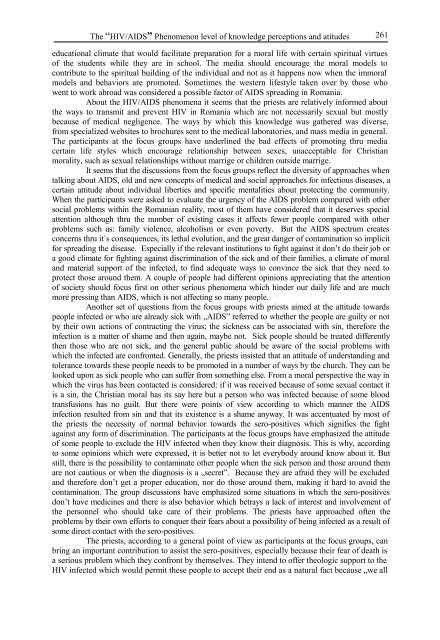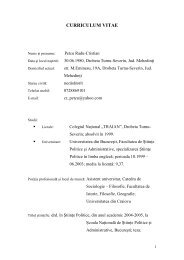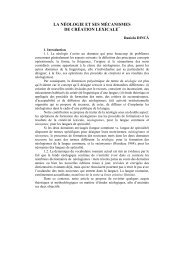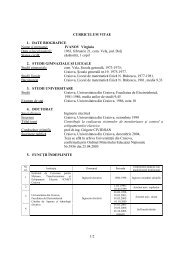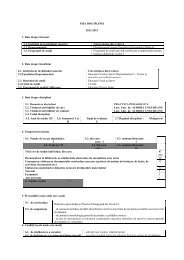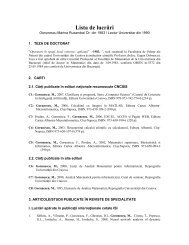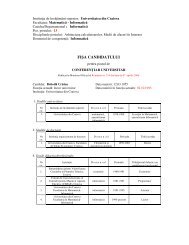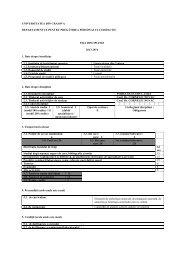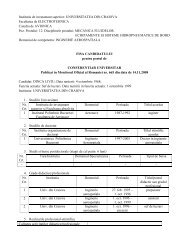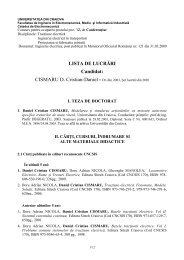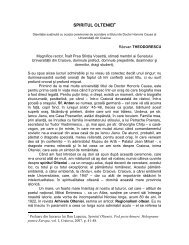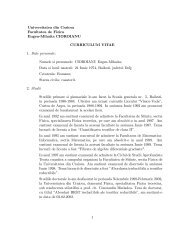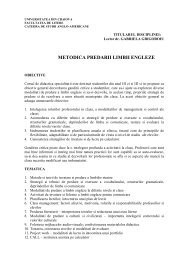ARHIVELE OLTENIEI - Universitatea din Craiova
ARHIVELE OLTENIEI - Universitatea din Craiova
ARHIVELE OLTENIEI - Universitatea din Craiova
- No tags were found...
Create successful ePaper yourself
Turn your PDF publications into a flip-book with our unique Google optimized e-Paper software.
The “HIV/AIDS” Phenomenon level of knowledge perceptions and atitudes 261educational climate that would facilitate preparation for a moral life with certain spiritual virtuesof the students while they are in school. The media should encourage the moral models tocontribute to the spiritual buil<strong>din</strong>g of the individual and not as it happens now when the immoralmodels and behaviors are promoted. Sometimes the western lifestyle taken over by those whowent to work abroad was considered a possible factor of AIDS sprea<strong>din</strong>g in Romania.About the HIV/AIDS phenomena it seems that the priests are relatively informed aboutthe ways to transmit and prevent HIV in Romania which are not necessarily sexual but mostlybecause of medical negligence. The ways by which this knowledge was gathered was diverse,from specialized websites to brochures sent to the medical laboratories, and mass media in general.The participants at the focus groups have underlined the bad effects of promoting thru mediacertain life styles which encourage relationship between sexes, unacceptable for Christianmorality, such as sexual relationships without marrige or children outside marrige.It seems that the discussions from the focus groups reflect the diversity of approaches whentalking about AIDS, old and new concepts of medical and social approaches for infectious diseases, acertain attitude about individual liberties and specific mentalities about protecting the community.When the participants were asked to evaluate the urgency of the AIDS problem compared with othersocial problems within the Romanian reality, most of them have considered that it deserves specialattention although thru the number of existing cases it affects fewer people compared with otherproblems such as: family violence, alcoholism or even poverty. But the AIDS spectrum createsconcerns thru it`s consequences, its lethal evolution, and the great danger of contamination so implicitfor sprea<strong>din</strong>g the disease. Especially if the relevant institutions to fight against it don’t do their job ora good climate for fighting against discrimination of the sick and of their families, a climate of moraland material support of the infected, to find adequate ways to convince the sick that they need toprotect those around them. A couple of people had different opinions appreciating that the attentionof society should focus first on other serious phenomena which hinder our daily life and are muchmore pressing than AIDS, which is not affecting so many people.Another set of questions from the focus groups with priests aimed at the attitude towardspeople infected or who are already sick with „AIDS” referred to whether the people are guilty or notby their own actions of contracting the virus; the sickness can be associated with sin, therefore theinfection is a matter of shame and then again, maybe not. Sick people should be treated differentlythen those who are not sick, and the general public should be aware of the social problems withwhich the infected are confronted. Generally, the priests insisted that an attitude of understan<strong>din</strong>g andtolerance towards these people needs to be promoted in a number of ways by the church. They can belooked upon as sick people who can suffer from something else. From a moral perspective the way inwhich the virus has been contacted is considered: if it was received because of some sexual contact itis a sin, the Christian moral has its say here but a person who was infected because of some bloodtransfusions has no guilt. But there were points of view accor<strong>din</strong>g to which manner the AIDSinfection resulted from sin and that its existence is a shame anyway. It was accentuated by most ofthe priests the necessity of normal behavior towards the sero-positives which signifies the fightagainst any form of discrimination. The participants at the focus groups have emphasized the attitudeof some people to exclude the HIV infected when they know their diagnosis. This is why, accor<strong>din</strong>gto some opinions which were expressed, it is better not to let everybody around know about it. Butstill, there is the possibility to contaminate other people when the sick person and those around themare not cautious or when the diagnosis is a „secret”. Because they are afraid they will be excludedand therefore don’t get a proper education, nor do those around them, making it hard to avoid thecontamination. The group discussions have emphasized some situations in which the sero-positivesdon’t have medicines and there is also behavior which betrays a lack of interest and involvement ofthe personnel who should take care of their problems. The priests have approached often theproblems by their own efforts to conquer their fears about a possibility of being infected as a result ofsome direct contact with the sero-positives.The priests, accor<strong>din</strong>g to a general point of view as participants at the focus groups, canbring an important contribution to assist the sero-positives, especially because their fear of death isa serious problem which they confront by themselves. They intend to offer theologic support to theHIV infected which would permit these people to accept their end as a natural fact because „we all


